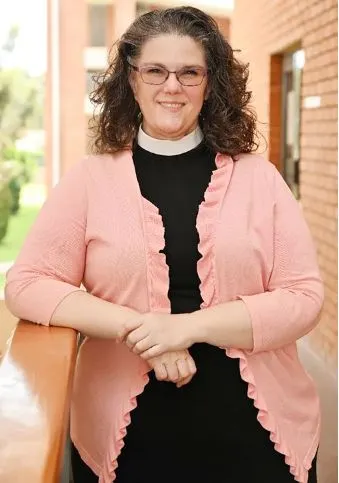By Pauline Luba
In 2022, Jessica Hughes, a USA missionary serving at Uganda Christian University (UCU), Mukono, found herself in every academic’s dilemma of trying to condense a voluminous thesis into a journal article. For Hughes’ case, she was adapting a 300-plus-page thesis into an article for Missionalia, a journal of the Southern African Missiological Society.
She succeeded. Her journal article, titled The Influence of the Missionary Legacy on the Practice of Discipleship in the Anglican Church of Uganda, was published on December 30, 2022. The article, co-authored with Marilyn Naidoo, a professor in the discipline of Practical Theology at the University of South Africa, centers on discipleship, a subject Hughes confesses she has always been passionate about. Naidoo supervised Hughes for her doctorate.
Hughes argues that currently, in the Church of Uganda setup, “evangelism is still the hallmark and priority of the church.”
“The number of people ‘saved’ in a service is often publicized, even among the bishops’

press releases regarding their pastoral visits,” the paper argues, suggesting that such actions have made discipleship take a backseat to evangelism in terms of church priorities. Much as evangelism leads to widespread professed Christianity, it may not also lead to a “skin-deep” faith.
According to Hughes, a missionary serving under the Pennsylvania-based Society of Anglican Missionaries and Senders (SAMS), seeking to gain more believers and numbers rather than deepening the spiritual maturity of the believers makes the church “send people to evangelize, yet they are supposed to make disciples.” And she bases this argument on Matthew 28:19: “Therefore, go and make disciples of all nations, baptizing them in the name of the Father, and of the Son, and of the Holy Spirit.”
Discipleship is not only bringing people to God, but also being able to relate to them and deepening their faith, Hughes, who has been a lecturer at UCU for over a decade, explained during a Zoom interview from the US state of Virginia. In addition to being a lecturer, she is currently UCU’s head of the Online Distance Learning (ODL) department – more commonly known by students as eLearning.
During the interview, Hughes offered suggestions on how the faith of a newly saved soul could be strengthened – by spending more time in prayer and answering questions together, so that there is more learning. “It’s hard to grow in faith when one is not being corrected,” she reasoned.
Another central pillar in Hughes’ paper is the concept of inculturation, which is the process of assuming or assimilating the behaviors and beliefs of another culture. The paper argues that the lack of the inculturation of Christianity “has caused it not to become a part of the culture, and that means that Christianity, though widely accepted, has not been involved in molding and shaping the Ugandan worldview.”
The experience of Christianity, it has been argued, can be expressed by cultural means. And Hughes believes that inculturation is one of the easiest ways to attain this. The Gospel can be fused with traditional practices, she argues, citing the example of cultural dancing and singing, while still glorifying the Lord. Such a blend, Hughes’ paper argues, will lead to an African Christianity, which “honors both the culture and the gospel,” and is more relatable to Africans. Western Christianity, according to the paper, rarely gives room to the voices from the global south to be heard.
“Tribes could still have their beautiful dances and speak their beautiful languages while continuing to worship God and spreading the Gospel,” she said during the virtual interview, where Uganda Partners sought to deeper understand reflections in the article.
Hughes is aware that through her propositions, she is not asking for too much. And she subtly makes this point by drawing from the practices in Kenya, Uganda’s neighbor to the east: “An example of how to inculturate the gospel is found in the Anglican Church of Kenya (ACK) and how they develop liturgies, rather than only importing liturgies from the West,” she writes.
“The ACK has contextualized the liturgies to reflect African culture, by incorporating the ancestors, particularly in the section of the Holy Communion liturgy. Rather than the standard ‘therefore, with angels and archangels and all the company of heaven’, the Sanctus in the ACK reads, ‘therefore, with angels, archangels, faithful ancestors and all in heaven’,” she writes in the paper, as though reading from the same script that Pope Francis has always read.
In 2021, the Pope called for Christian freedom, by rooting for the respect for other people’s cultures and traditions. “How many errors have been made in the history of evangelization by seeking to impose a single cultural model,” the Pope asked during his address to the weekly general audience at the Vatican.
Explaining that unity does not mean uniformity, the Pope argued that in the call to freedom, one discovers the true meaning of the inculturation of the Gospel.
Writing on her blog, the Virginia-USA-born missionary notes that she initially had no plans of coming to Africa as a missionary. However, this later changed. “My bishop, the Rt. Rev. John Guernsey, had suggested that I study abroad for my M.Div., and then suggested Uganda, since my home church (All Saints Anglican in Woodbridge, Virginia) had come under the Church of Uganda when we left the Episcopal Church,” she writes.
Hughes obtained an undergraduate degree from the George Mason University in Fairfax Virginia and a certificate as a legal assistant from George Washington University in 1993. In 2005, she earned her first master’s degree in human performance systems at Marymount University based in Arlington, Virginia. Her second was the Master of Divinity from UCU, which she got in 2011. She is now a lecturer at the university’s Bishop Tucker School of Divinity and Theology.


